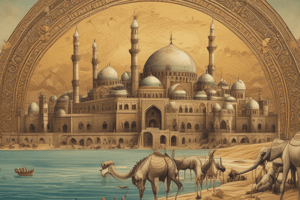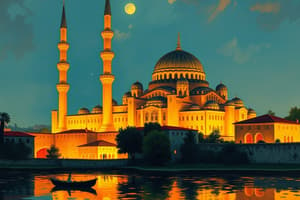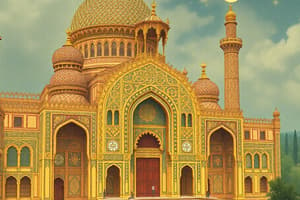Podcast
Questions and Answers
Why were people nomads on the Arabian Peninsula?
Why were people nomads on the Arabian Peninsula?
Because there was only a little water and farmland.
Why was Mecca an important religious and trade center?
Why was Mecca an important religious and trade center?
Mecca was important because the Kaaba was located there, attracting worshippers, and it was located along significant trade routes.
How did Muhammad receive messages from God and what did he think he was?
How did Muhammad receive messages from God and what did he think he was?
Muhammad received messages from God through Gabriel and thought he was the messenger of God.
Why did trade often lead to a cultural exchange?
Why did trade often lead to a cultural exchange?
What is the Kaaba and why is it important to Muslims?
What is the Kaaba and why is it important to Muslims?
What was Muhammad's role in the development of Islam?
What was Muhammad's role in the development of Islam?
List the two texts that guide Muslims and describe what they are.
List the two texts that guide Muslims and describe what they are.
List the Five Pillars of Faith and briefly describe them.
List the Five Pillars of Faith and briefly describe them.
What are the connections between Islam, Judaism, and Christianity?
What are the connections between Islam, Judaism, and Christianity?
How did leadership issues divide the Muslim community?
How did leadership issues divide the Muslim community?
Why did the Shiites oppose Umayyad rule?
Why did the Shiites oppose Umayyad rule?
How did Abd al Malik and the Umayyad caliphs bring unity to the Muslim Empire?
How did Abd al Malik and the Umayyad caliphs bring unity to the Muslim Empire?
Why did some Muslims protest under Umayyad rule?
Why did some Muslims protest under Umayyad rule?
Why did the Abbasids support the arts and learning?
Why did the Abbasids support the arts and learning?
Briefly list the important contributions made by Al-Razi, Ibn-Sina, Al-Biruni, Al-Khwarizmi, Al-Idrisi, and Al-Zahrawi.
Briefly list the important contributions made by Al-Razi, Ibn-Sina, Al-Biruni, Al-Khwarizmi, Al-Idrisi, and Al-Zahrawi.
How was Cordoba a major cultural center?
How was Cordoba a major cultural center?
Flashcards are hidden until you start studying
Study Notes
Nomadism on the Arabian Peninsula
- Limited water and farmland made people in the Arabian Peninsula nomadic.
Importance of Mecca
- Mecca is a religious center due to the presence of the Kaaba, a significant site for worship during Islamic holy months.
- As a trade center, Mecca’s location on Western Arabian trade routes facilitated commerce.
Revelation to Muhammad
- Prophet Muhammad received messages from God through the angel Gabriel while praying.
- He believed he was the messenger of Allah, marking the beginning of his prophetic mission.
Trade and Cultural Exchange
- Trade encouraged cultural exchange as merchants shared information about their respective cultures.
The Kaaba
- The Kaaba is a cube-shaped stone structure in Mecca central to Muslim prayer.
- It holds significance because it was built by Abraham and his son Ishmael.
Muhammad's Role in Islam
- Muhammad significantly contributed to the spread of Islam in Mecca and Medina, leading to a growing Muslim community.
Guiding Texts for Muslims
- The Quran contains the revelations of Allah.
- The Sunnah outlines the actions and teachings of Prophet Muhammad.
Five Pillars of Faith
- Faith: Declaring belief in one God.
- Prayer: Performing five daily prayers.
- Alms: Giving charity to assist the needy.
- Fasting: Abstaining from food, drink, or smoking during Ramadan.
- Pilgrimage: Undertaking a pilgrimage to Mecca at least once in a lifetime.
Connections Among Religions
- Islam, Judaism, and Christianity share beliefs in one God and the significance of Abraham.
- All three faiths acknowledge concepts like heaven, hell, and final judgment day.
Leadership Issues in the Muslim Community
- Discontent arose after Muhammad's death over leadership, causing division among Muslims.
- Factions formed as some opposed specific leaders' rules.
Shiite Opposition to Umayyads
- Shia Muslims opposed Umayyad rule, advocating for caliphs to be descendants of the Prophet Muhammad.
Unity Under Abd al-Malik and Umayyads
- Arabic was declared the official language, facilitating communication across the empire.
- Common coinage was introduced, promoting economic unity through easier trade.
Protests Under Umayyad Rule
- Discontent among some Muslims stemmed from the Umayyads' extravagant lifestyles and neglect of their responsibilities.
Abbasids and Support for Arts & Learning
- The Abbasids promoted arts and learning to showcase their wealth and strengthen their economy.
Contributions to Fields of Knowledge
- Al-Razi: Identified diseases such as smallpox and measles.
- Ibn-Sina: Authored the "Canon of Medicine," summarizing medical knowledge.
- Al-Biruni: Determined the direction of Mecca for prayer purposes.
- Al-Khwarizmi: Developed Arabic numerals and introduced the concept of zero.
- Al-Idrisi: Compiled an encyclopedia of geography, including 70 maps.
- Al-Zahrawi: Renowned for pioneering surgical techniques for various medical conditions.
Cordoba as a Cultural Center
- Cordoba was a hub for learning, housing 70 libraries, with the largest containing 400,000 books.
- Translations of Muslim texts into Latin helped disseminate knowledge across Europe.
Studying That Suits You
Use AI to generate personalized quizzes and flashcards to suit your learning preferences.




